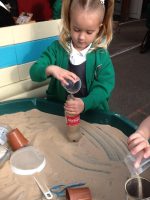



Maths at Mersham
Overview
Vision
Our Mathematics curriculum prepares all children at Mersham, including our SEND and disadvantaged pupils, for life after Primary School.
Our yearly curriculum is bespoke to each cohort and continually identifies known gaps in knowledge and skills. Practitioners use quality first teaching methods and accurate in-class, formative assessment to identify and support gaps in children’s learning and planning evolves throughout the year as a result of this. We teach pupils to make connections between areas of Mathematics and, where possible, allow them to make connections to real-life contexts so that their learning has meaning and purpose.
Mathematics is embedded in our curriculum and children experience and apply their knowledge and understanding in other inter-connected subject areas. Our pupils develop independence through their use of manipulatives, jottings and the Maths learning environment. We aim for all children to develop Mathematical fluency in the fundamentals of Mathematics; promoting independent and ambitious learners and thinkers. All our pupils are given opportunities to reason and problem solve. Within lessons, collaboration and discussion supports children in applying vocabulary and confidently verbalising their reasoning.
Teachers set high expectations through a challenging curriculum and mistakes are seen as valuable learning opportunities. Our pupils develop their resilience and perseverance through a challenging curriculum that promotes risk-taking and reflection. Within classes, children move through the curriculum at broadly the same pace. Pupils who grasp concepts rapidly are challenged through sophisticated problems and questioning. Children in EYFS and KS1 gain a secure understanding of counting and number.
How is Mathematics taught?
All pupils at Mersham are mathematicians and have opportunities to:
- Develop a level of fluency that builds confidence in manipulating numbers and making connections.
- Reason about Mathematics, using secure mathematical vocabulary.
- Apply Maths fluently in other areas of the curriculum and see its use and application in everyday life.
- Be resilient and problem solve.
- Express their understanding in a variety of ways (verbally, using concrete manipulatives, informal jottings, formal methods)
The Foundations of our Maths Curriculum (What is taught and where?)
The aims of the National Curriculum are sophisticatedly woven into our whole school Maths Curriculum design, enabling all children at Mersham to:
- Become fluent in the fundamentals of mathematics, including through varied and frequent practice with increasingly complex problems over time, so that pupils develop conceptual understanding and the ability to recall and apply knowledge rapidly and accurately.
- Reason mathematically by following a line of enquiry, conjecturing relationships and generalisations, and developing an argument, justification or proof using mathematical language
- Can solve problems by applying their mathematics to a variety of routine and nonroutine problems with increasing sophistication, including breaking down problems into a series of simpler steps and persevering in seeking solutions.
(National Curriculum, 2014)
- Yearly overviews (which are adapted throughout the year according to the needs of each cohort) outline progression in each new concept/block of learning and display the National Curriculum objectives, the ‘Ready to Progress Criteria’ (NCETM) and the White Rose small steps. These documents serve as a working document to evidence gaps in prior learning and areas for future development. By combining these elements, we have designed the foundations of a robust Maths curriculum.
- The ‘Ready to Progress Criteria’ are used to prioritise the most important Maths knowledge and understanding in each year group, but breadth is provided in other key areas (e.g. fractions in KS1).
- ‘Maths Mastery’ has been strategically introduced in classes through our involvement in the Maths Hub and the key elements of; Fluency, Variation, Representation and Structure, Mathematical Thinking and Coherence have been embedded in our teaching of Maths.
- The White Rose planning structure is utilised to ensure that sufficient weighting is given to priority concepts.
How the Curriculum is Implemented (What it looks like in practice)
- Children in Years R, 1 and 2 participate in regular ‘Mastering Number’ sessions. The programme is designed to secure firm foundations in the development of good number sense for all children so that they leave KS1 with fluency in calculation and confidence and flexibility with number.
- Our Maths curriculum is based on the White Rose scheme. Its resources are used to supplement lesson activity design and ensures a consistent use of models and representations avoids cumulative disfluency and ensures cohesion.
- Children are ‘exposed’ to Maths daily in classes. This can be through direct teaching in lessons, the learning environment or via teachers and support staff facilitating mathematical thinking in play activities in EYFS.
- Children are given regular opportunities to reason mathematically by following a line of enquiry, conjecturing relationships and generalisations, and developing an argument, justification or proof using mathematical language.
- Conceptual fluency is developed through the careful selection of a variety of representations and models. These are consistent and built upon throughout the school to provide cohesion.
- Opportunities are sought to make Maths activities active.
- Teachers apply variation (both procedural and conceptual) to their lesson activities to develop fluency and support children in making connections.
- From EYFS-KS2, teachers understand the importance of manipulatives to support teaching and understanding of concepts.
- Children’s understanding progresses from ‘Concrete’, to ‘Pictorial’, to ‘Abstract’ within concepts.
- Opportunities for regular consolidation, pre-teaching or intervention is provided for those learners who are not sufficiently fluent.
Mathematics Yearly Overviews
Here is an outline of the curriculum for each Year group. Please note, these are adapted on a yearly basis to suit the needs of each cohort. Throughout the year, areas for consolidation are added and at the end of each academic year, the ‘areas to revisit’ are included to ensure that gaps in knowledge are quickly addressed.
Maths Overview EYFS 2022- 2023
Maths Overview YEAR 1 2022-2023
Maths Overview YEAR 3 2022-2023
Maths Overview YEAR 4 2022-2023
Maths Overview YEAR 5 2022-2023
Maths Overview YEAR 6 2022-2023
